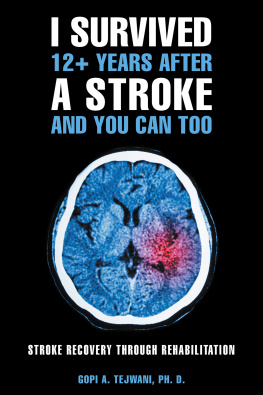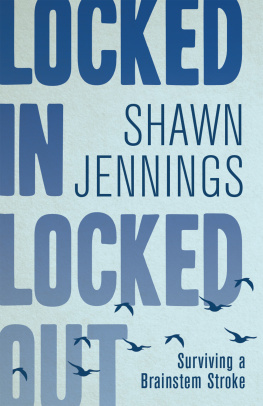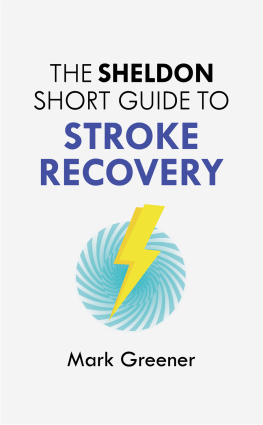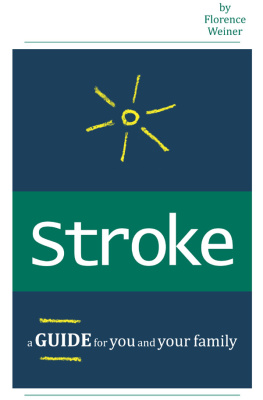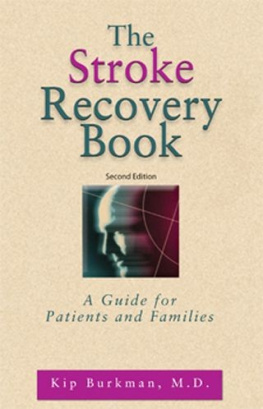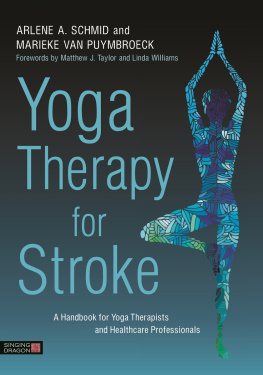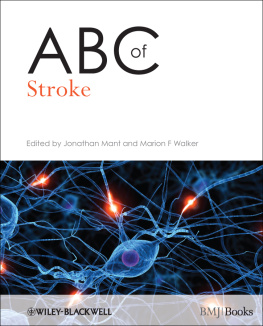I SURVIVED
12+ YEARS AFTER
A STROKE
AND YOU CAN TOO
STROKE RECOVERY THROUGH REHABILITATION
GOPI A. TEJWANI, PH. D.

AuthorHouse
1663 Liberty Drive
Bloomington, IN 47403
www.authorhouse.com
Phone: 833-262-8899
2020 Gopi A. Tejwani, PH. D. All rights reserved.
No part of this book may be reproduced, stored in a retrieval system, or
transmitted by any means without the written permission of the author.
Published by AuthorHouse 09/29/2020
ISBN: 978-1-6655-0215-3 (sc)
ISBN: 978-1-6655-0216-0 (hc)
ISBN: 978-1-6655-0285-6 (e)
Library of Congress Control Number: 2020919076
Any people depicted in stock imagery provided by Getty Images are models,
and such images are being used for illustrative purposes only.
Certain stock imagery Getty Images.
Because of the dynamic nature of the Internet, any web addresses or links contained in
this book may have changed since publication and may no longer be valid. The views
expressed in this work are solely those of the author and do not necessarily reflect the
views of the publisher, and the publisher hereby disclaims any responsibility for them.
CONTENTS
October 7, 2008, was a day like any other till the moment a devastating stroke in my brain stem changed my life forever.
With the stroke, began a new phase in my lifeone that started with a six-week-long stay in the hospital, of which two weeks were in a coma. When I regained my senses after two weeks I was perplexed as to what and how it happened. I started asking myself why me? Is this the end of my life? All of a sudden, my limbs were not working, I could not eat on my own, I could barely stand, and my speech was slurred so much so that most people had a hard time understanding me. My stroke left me in a wheelchair for three months, six months on sick leave from work, and without the ability to drive for two whole years.
This book is about my twelve-year struggle with stroke recovery beginning from the time I first opened my eyes at Dodd Hall rehabilitation hospital. Prior to this, I only remember the first five seconds following the stroke and have vague recollections of the first thirty minutes when the paramedics came. My dreams when I was in a coma remain vivid technicolor! I am still at loss to explain all the dreams, though few of them correlate with my medical disorders at the time, such as the urinary infection. The book describes the assistance I received from various therapists, family, and friends.
In this book, I will describe in detail the numerous problems I suffered as a result of the stroke, such as paralysis of the right side of my body, balance issues, insomnia, double vision, an elevated heart rate, among a host of other problems. Today, I am dependent on a right Ankle-Foot-Orthotics (AFO) and a walking cane. I will also discuss the various mental and emotional issues that I faced after the stroke.
This book is my journey of recovery and self-healing through hard work, medical assistance, and prayer over twelve years. I want to share my experiences in the hope that it can help another person in a similar predicament. The book talks about gamma knife surgery, massage therapy, and Botox injections, as well as the value of these procedures in the treatment of a stroke.
Why did I write this book?
The reasons for writing this book are manifold. For all stroke victims out there who are asking why me? I just want to say that you are not alone. If there is one thing I want to achieve through this book is to convey the message that even though a stroke can be debilitating but it is not the end of life.
Do not ask yourself: Did I deserve a stroke? It is a fruitless question. One has to toughen up. Be optimistic. And do your best. Remember that there are people who are worse off than you, so be grateful for what you have. When I had my stroke, I thought that it was the end of my life. I could barely stand up straight and needed the help of three people to help me walk twenty feet! I was being fed through a feeding tube from my abdomen into the stomach. But I didnt give up. With support from my wonderful family and friends, I worked very hard; took therapy; and stayed optimistic.
If I can inspire even one person to not to give up hope and double their efforts, I have achieved my goal. I hope that this book serves a valuable tool to millions of stroke patients, their families, and friends, and brings back the joy in their life.
It was an ordinary Tuesday afternoon.
I had just stepped into my office at the Ohio State University (also called the OSU), where I had been teaching for more than three decades. The day seemed full of promise. I was feeling particularly upbeat and had even put on a new shirt and tie. No reason, really. Or, perhaps it was because I was subconsciously excited about my upcoming vacation to South Africa with my wife, Sarla, and friends. Our bookings were all done. The tour agency we had sought help from was well known in their field. Yes, I was excited. All that was left to do was pack our bags. Life was good. I thought to myself, it was going to be a good day.
A couple of hours later, I still had a spring in my steps. I was sixty-two years old and happy. The OSU was a second home to me. I knew everyone around, and they knew me. Every time I stepped out of my office, there was usually someone who would wave a hello. Hello Dr. Tejwani, how are you? I would always smile back in acknowledgment. Today was no different. I bumped into a few familiar faces on the way. This is how it was always.
At sharp 1 pm, I opened my lunch box to eat. It was my favorite meal of rice and shrimps. I had just started to eat when suddenly, I remembered the date. October 7, 2008! It was my friend Dr. Ashok Singhs birthday. Ashok and I go back a long way. He was a fellow graduate student at the All India Institute of Medical Sciences in New Delhi in the early 1970s. I always remember his birthday. Without wasting a minute more, I promptly took out my phone and dialed his number. The phone buzzed for a few seconds before I heard the familiar voice at the other end. Hello! Hello!
Ashok! Happy birthday!
Ashok was happy to hear from me as he always was. We had a short conversation and then I hung up. While speaking with Ashok, it occurred to me that I had not paid three police penalty tickets when I had visited him in Chicago a few months back. This was because I was on the main highway and the toll booths were on the side of the road. I had simply zoomed past without paying my dues. I decided to clear them immediately.
I opened the browser of my Personal Computer to search for the penalty-paying site. Ah! There it was. Just when I took out my credit card to pay, my office phone rang out. It was a student from my Pharmacology 600 course. He needed some clarification on a topic I had been teaching recently. We were speaking for a few minutes when I thought I heard him scream. But why?
Dr. Tejwani! You are not making any sense! Dr. Tejwani!
Time seemed to move in slow motion, and I thought to myself. But why? Why doesnt he understand? Why am I not making any sense? And then, all of a sudden, as if a cloud had been lifted from my senses, I heard myself out loud.
Yaaaaaaaaaaa
Then, the phone fell from my hands and I passed out on the floor.
Every year in the United States, an average of 800,000 people are victims of stroke, of which about 130,000 die. Undoubtedly, this is a large number.
But let us first understand what a stroke is.
The brain is a highly vascular organ, which requires a constant supply of oxygen to nourish it. Oxygenated blood is carried through arteries originating in the heart. The brain also contains the pituitary gland, which plays a major role in regulating vital functions and the general well-being of the body. For this reason, it is sometimes called the master gland of the human body. Lack of oxygenated blood to the brain causes severe damage to the organ and is deemed a medical emergency. When the supply of oxygen to the brain is cut off, a sudden loss of brain function occurs. This condition is called a stroke.
Next page
